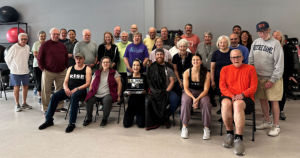Parkinson’s group thanks Metz for mindfulness training
Current studies on mindfulness and Parkinson’s disease are showing promising results, including significant reductions in anxiety, depression and distress about the symptoms, as well as improvements in memory and verbal fluency. “Breathe!” say some studies. “Take a deep breath, and you’ll be fine.”
The act of breathing, normally a subconscious process where one inhales and exhales, can actually reduce cortisol levels through activation of the parasympathetic nervous system, signaling to one’s body that everything is OK.
Formed in 2009, the Parkinson’s Education and Support Group of Sussex County comprises a community of volunteers, caregivers, experts and people living with Parkinson’s disease. The group focuses on providing support for the PD community through exercise, education and emotional support.
Exercise has been proven to be the one most effective medicines to slow down the progression of Parkinson’s disease. Group members meet for a maintenance exercise program at Rise Fitness and Adventure in Rehoboth Beach. Mindfulness meditation and breath work are just two of the many useful forms of exercise for the brain.
A couple times each week, Nate Metz, E-RYT 200, LMT, leads the group in mindfulness exercises. Metz teaches a combination of yoga techniques like pranayama, mantra and visualization that work at alleviating PD symptoms, provide stress relief, and improve sleep. The mind-body connection is powerful already, but with training and practice, it can become a super power. These exercises are among the best tools available for slowing the progression of an incurable disease and improving the quality of life for all.
In appreciation of his generosity and knowledge, support group members recently presented Metz with a special Super Nate cape adorned with the mantra “AUMAUMAUMAUMAUMAUM” across the bottom.
Some people with Parkinson’s disease may experience shortness of breath. Wearing off is a common experience among people with PD who have been taking levodopa for several years. It occurs when the medication benefit wears off and PD symptoms (including shortness of breath) return before the next dose has taken effect.
Respiratory dyskinesia is an occurrence of irregular and rapid breathing, typically occurring when levodopa medications reach their peak effect. This is typically accompanied by dyskinesia (writhing movements) of other body parts.
Anxiety is a common symptom of PD that may also exacerbate shortness of breath. Anxiety may occur by itself or as a consequence of medication wearing off.
Aspiration pneumonia can develop after food or liquid “goes down the wrong pipe.” Advanced PD can increase the risk of swallowing difficulties, choking and aspiration pneumonia.
Non-PD health issues including conditions such as asthma, allergies, lung disease, heart disease and others may cause shortness of breath.
With regular exercise, people can become more aware of their tendencies to quickly react or respond to negative, unhelpful patterns of thinking. By incorporating mindfulness exercises in the classes, the support group hopes to build members’ awareness of finding a calmer perspective on stressful situations and negative emotions.






















































